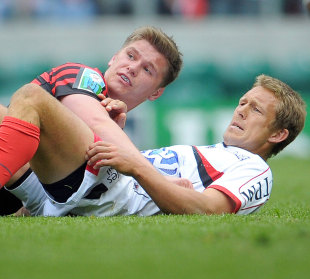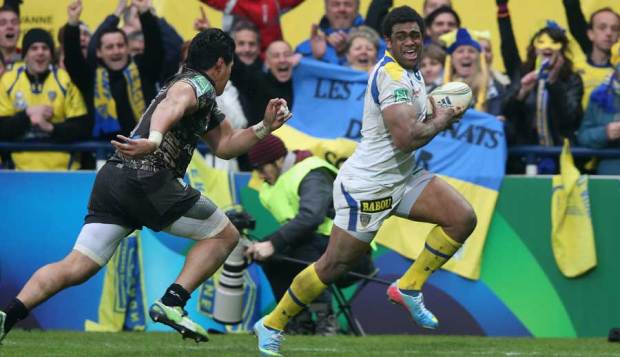|
Numbers Game
Deconstructing the Heineken Cup
Huw Richards
May 7, 2013

Toulon will look to make history against Clermont on May 18
© PA Photos
Enlarge
As so often the Heineken Cup sends a different picture of Europe's balance of power to that offered by the Six Nations. France may have had a lousy year at national level, but its monied clubs were never more potent in the Heineken. The Clermont-Toulon finale in Dublin rounds off a theme which has run though this year's tournament like the name through a stick of rock. In a year when teams from Six Nations champions Wales produced by far their worst ever performance (19.44% winning percentage), France's seven teams displaced the Irish as the statistically dominant force in the pool stage. While the Irish score (66.67%) was marginally depressed by Connacht's qualification, France too had an extra side - and their seventh qualifier, Biarritz, had the same 3-3 record as Connacht. The French septet had a winning percentage of 69.05%, compared to England's 59.72%. Perhaps most striking, given the historic tendency of French clubs to downgrade the Heineken once qualification seems unlikely, is that all seven won at least three of their six pool matches. Clermont and Toulon is the first climax matching two first-time finalists since 2000, when Northampton beat Munster 9-8. Ten different teams contested the first six finals, but since then only four more first-timers - Perpignan in 2003, Wasps in 2004, Biarritz in 2006 and Leinster in 2009 - had joined the list. The French duo take the total number of teams who have contested the final to 16, of whom eight are French, compared to four English teams, three Irish provinces and the lone Welsh contender, Cardiff in the opening final in 1996. It will also be the fourth all-French final, following those of 2003, 2005 and 2010. That compares to a single all-English final, the Wasps-Leicester clash of 2007, and last year's all-Irish derby between Leinster and Ulster. So far, so dominant. But if getting to finals is a particular French strength - the match on May 18 will take the total number of French finalists to 16, compared to 10 from England, nine from Ireland and that lone appearance by Cardiff - winning is another matter.
Whoever wins in Dublin, France will have taken the trophy six times - a three-way split with England and Ireland of the Heineken's first 18 seasons, but hardly a spectacular return on those 16 appearances. The Irish trio have only three defeats, two inflicted on Munster and the third from last year's all-Irish final to set against their six wins. The English have four, three of them inflicted on Leicester, the only team to have lost so many finals. All three Irish teams who have played in a Heineken final have at some time won the trophy. So have the English quartet of Leicester, Wasps, Northampton and Bath. The French picture is very different. Whichever of Clermont and Toulon comes out on top will be the third French winner - joining four-time champion Toulouse and the Brive team of 1997 who remain perhaps the most spectacular of all Heineken winners. The loser will add to the already long list of French clubs - Colomiers, Stade Francais (twice), Perpignan and Biarritz (twice) who have made it to the final, but are yet to lift the trophy.

Napolioni Nalaga helped put Montpellier to the sword in the quarter-finals © Getty Images
Enlarge
That Brive win in 1997 looks in retrospect like the tournament's great false dawn, and not only for a club enjoying a brief peak of brilliance it was unable to sustain for very long. Aside from the sheer style with which their 28-9 win over Leicester was delivered it also, together with Toulouse's 21-1`8 win in Cardiff a year earlier, seemed to set down a pattern - which was that the best of the French would be able to beat the best of the British and Irish. That hasn't happened. Brive were the last French club to beat a team from any other country in a Heineken final. The three wins since, all by Toulouse, have been in all-French finals. None, incidentally, has been terribly memorable as a spectacle. Of the 109 points scored, only 15 have come from tries, only one of them - by Vincent Clerc as they ran up a 19-0 half-time lead over Perpignan in Dublin in 2003 - scored by Toulouse.

The Brive class of 1997
© PA Photos
Enlarge
Since 1997 the French are, as Americans would put it, 0 for 6 in finals against other countries. The trend began with Brive's narrow 19-18 defeat by Bath in 1998 and was continued the following year by Colomiers, washed away 21-6 in a tide of cross-border Irish passion by Ulster at Lansdowne Road. Playing at the Parc des Princes, next door to their home ground, on a day when Diego Dominguez was kicking everything still wasn't enough to give Stade Francais victory over Leicester in 2001. Not even Toulouse have been immune, falling 27-20 against Wasps in an epic contest in 2004 then getting ground down 16-13 by Munster in Cardiff four years later. That, of course, was the second time that Munster had undone the French, the memorable conclusion to their pursuit of the trophy having come two years earlier on the same ground against Biarritz. Clermont meanwhile stand on the verge of a very distinctive Heineken feat. To win would make theirs the first 'perfect season' since the Heineken introduced its six-match pool stage in 1998. Nine teams have previously won all six, but only four of these have even managed to win the home quarter-final that inevitably comes with the feat. Northampton, in 2011, got closest to the perfect Heineken season, reaching the final and looking sure winners when they led Leinster 22-6 at half-time, only for the Irishmen to stage an extraordinary 27-0 second-half revival. Of the three who at least made it to the semi-finals, Cardiff could count themselves unluckiest. They exited the tournament without ever losing a match, going down to Leicester when cherished veteran Martyn Williams was off target in the penalty shoot-out which followed a 26-26 draw after extra time. © ESPN Sports Media Ltd.
| |||||||||||||||
Live Sports
Communication error please reload the page.
-
Football
-
Cricket
-
Rugby
-
- Days
- Hrs
- Mins
- Secs
F1 - Abu Dhabi GP
Abu Dhabi Grand Prix December 11-131. Max Verstappen ()
2. Valtteri Bottas (Mercedes)
3. Lewis Hamilton (Mercedes)
4. Alexander Albon ()
5. Lando Norris ()
6. Carlos Sainz Jr ()
-
ESPNOtherLive >>
Snooker - China Open
Tennis - Miami Open

